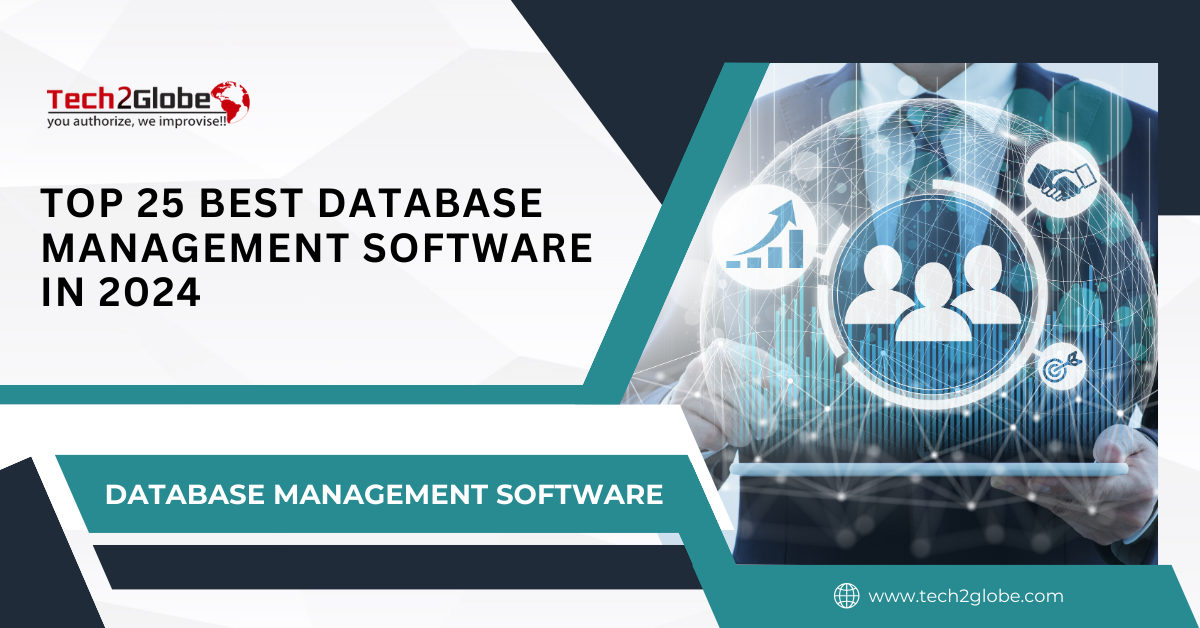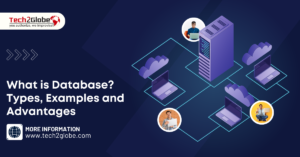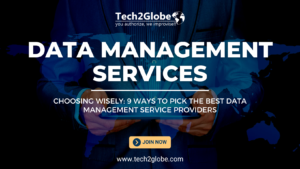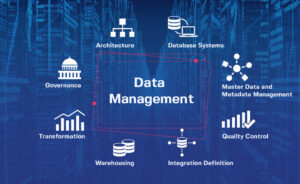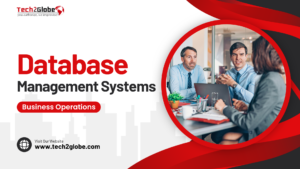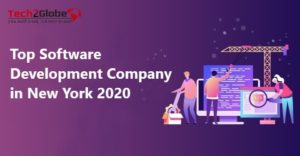Selecting the right database management system can be a challenging decision for any organization. In 2024, there’s an array of options to consider. But amidst the multitude of choices, how does one navigate the maze of database management software to find the perfect fit? What sets apart the top contenders from the rest?
We’ve compiled a list of the top 25 database management software options to assist you in choosing the one that best meets your technical and business needs. Database software allows a company to immediately update, create, define, or send queries to an administrative database. This facilitation can be transformative for businesses seeking to capitalize on multiple data formats and retrieval methods.
Let’s explore the advanced tools that are shaping the future of data management in 2024.
Choosing the Most Suitable Database Management Software
For small and established businesses, it’s essential to choose a popular database management software (DBMS) with multiple options, scalability, and sophistication to complement your product or service. Here are 25 top DBMS that can boost productivity and reach your full potential.
1. Improvado
Improvado is a real-time best data management software for marketers that includes automatic dashboards and reporting.
Improvado is a “data pipeline” that pulls data from your marketing platforms (Facebook, Google Analytics, Ad Servers, CRMs, email systems, and so on) and “pipes” it into whatever data warehouse or visualization tool you like. Brands, agencies, and institutions love Improvado because it has saved them thousands of hours of manual reporting time and millions of dollars in lost marketing expenditure.
2. Microsoft SQL Server
MS SQL Server is a Relational Database Management System (RDBMS) created by Microsoft. A relational database is built on the Relational Model architecture. The data is structured into tables (relations), which are connected. Each table has rows and columns (attributes). MS SQL Server is a database administration and information retrieval software package.
3. PostgreSQL
The open-source DBMS system attracts attention because of its exciting indexing and customization features. PostgreSQL is suited for daily business tasks that need data import or export.
Currently, PostgreSQL supports Python and JSON programming languages. Although it is a relational database system, users may develop NoSQL databases. Furthermore, the open-source community has developed a large range of plug-ins to improve the software’s capabilities.
4. My SQL
MySQL is the world’s most popular open source database, powering many popular applications like Facebook, Twitter, Netflix, Uber, Airbnb, Shopify, and Booking.com. It is a relational database management system that stores data in separate tables and uses the logical data model. MySQL is open source, allowing anyone to use and modify the software without paying for it. The MySQL logo features a dolphin named Sakila, chosen from a contest.
5. Amazon RDS
Amazon RDS is an easy-to-manage relational database solution. It is simple to set up, run, and grow according to need. Amazon RDS allows clients to create new databases in minutes and gives the ability to tailor databases to match their specific needs across 8 engines and two deployment methods. Customers may maximize speed with features such as Multi-AZ (two readable standbys), Optimized Writes and Reads, and AWS Graviton3-based instances. Pricing options are available to control expenses efficiently.
6. Oracle RDBMS
Oracle Database is a well-known and reliable Relational Database Management System (RDBMS). Many people prefer using this database management system to store, organize, and retrieve data based on type. The benefit of employing this management system is that it successfully maintains linkages among the various types.
Oracle Database’s scalable relational database design makes it popular among businesses worldwide. According to one assessment, over 245 organizations utilize Oracle Database as part of their IT stack.
7. Razor SQL
RazorSQL is a SQL editor and database querying application for macOS, Windows, Linux, and Mac OS X. It uses ODBC or JDBC to connect to MySQL, Oracle, MS SQL Server, SQLite, PostgreSQL, DB2, Sybase, SQL Anywhere, Derby / JavaDB, Firebird, Informix, HSQLDB, Salesforce, SimpleDB, SQL Azure, Teradata, DynamodB, and a variety of other databases. Users can use it to import and export data in a number of formats, as well as compare table data from other databases. It contains visual tools for creating, editing, describing, executing, and deleting database objects, serving elements of data management services in one tool.
8. Microsoft Access
Microsoft Access is a well-known database management system developed by Microsoft and included with the Microsoft 365 office suite. Microsoft Access integrates Microsoft’s relational Jet Database Engine with software development tools and a graphical user interface (GUI). It was originally released in November 1992, thus it has been around for a long time. In today’s quickly changing and fast-paced IT environment, a 30-year-old application is best described as “venerable.” Microsoft Access holds the distinction of being the first mass-market database application for Windows.
9. SQL Developer
The open-source DBMS tool is popular among developers since it is effective for designing, developing, and doing other database administration tasks. The most advantageous feature of SQL Developer is that it takes less time to conduct many queries. As a result, users create queries in a variety of forms, including PDF, HTML, XML, and Excel.
10. Informix
IBM Informix is an embeddable, high-performance database that integrates SQL, NoSQL, JSON, time series, and geographical data. It is offered through IBM Cloud Pak for Data. The low-footprint database, designed for edge, cloud, and on-premises analytics, has self-management and automated administrative capabilities. You can now install a containerized version of Informix on the IBM Cloud Pak for Data platform more quickly, whether in public, private, or hybrid clouds.
11. Altibase
Altibase is an open-source, enterprise-grade relational database that is Oracle-compatible and interoperable. It combines an in-memory database and an on-disk database to form a single database with a standardized interface for faster data processing. Because of its hybrid structure, data can be stored and manipulated in main memory, on physical disk, or a combination of the two, eliminating the need for users to purchase separate in-memory and on-disk databases.
12. EMS
EMS Database Management Solution allows for the creation of unique data analytical components and offers robust vendor support for database management activities. It is designed for users to monitor existing databases and offers easier maintenance, improved system performance, and integration with multiple SQL tools, making execution of multiple queries straightforward on databases.
13. Redis
Redis (for REmote DIctionary Server) is an open source, in-memory, NoSQL key/value store that is generally used as an application cache or quick-response database. It provides unprecedented speed, reliability, and performance since it saves data in memory rather than on a disk or solid-state drive (SSD).
14. IBM DB2
IBM Db2 on Cloud is a managed public cloud service that offers fast query processing and enterprise-level performance. It is a column-organized, in-memory data warehouse designed for complex analytics and extreme concurrency. It uses IBM BLU Acceleration, a collection of technologies, which optimizes columnar organized storage, in-memory processing, compressed data set querying, and data skipping.
15. Teradata
Teradata is a DBMS tool with excellent processing speed, real-time processing, and large database distribution capabilities. Its data analytics are crucial for successful enterprise-level business operations. It offers well-designed permission controls and amalgamated data storage through flexible multi-variant formats.
16. FileMaker
FileMaker provides excellent SQL connectivity and information exchange possibilities. The best feature of FileMaker is the ability to create custom templates that enable users to manage data reports, charts, and invoicing. As a result, the product exudes professionalism and understanding when it comes to data management. Alliance trainers offer in-person courses to help users comprehend the software.
17. Advanced Query Tool
AQT is a Windows application that accesses data via ODBC while being aware of the catalog structures of most common databases. The ODBC catalog is quite slow on large systems, while AQT directly searches the catalog meta data of well-known database management systems, making it extremely quick for investigating the data structures of enterprise-sized databases.
18. SQLite
SQLite is a popular and user-friendly relational database system. It has some advantages over other relational databases. Many large multinational corporations, like Adobe, use SQLite as the application file format for their Photoshop Lightroom products. Being an in-memory open-source library it doesn’t require any configuration or installation. Furthermore, it is quite convenient because it is less than 500kb in size, which is substantially smaller than other database management systems.
19. Couchbase
Couchbase manages JSON documents; therefore, the database does not require a hard-coded schema. The developer controls the schema through the application object description, which is provided in JSON. Developers enter the JSON once into this database and then use multiple data processing capabilities on it.
20. Robot 3T
Robot 3T, formerly known as Robomongo, is one of the best DBMS softwares for handling a big volume of workload. It has stable integrated features and is almost error-free. However, the tool is best known for its visually appealing drag-and-drop query building functionality.
21. Cloudera
Cloudera can automatically increase database performance in response to application requirements and resolve issues without the need for operator intervention. It also scales up or down automatically, dependent on the needs of your application, allowing you to save money on cloud hosting.
22. HammerDB
HammerDB is regarded as one of the most underappreciated benchmark database technologies, supporting a variety of languages and applications. It features a multi-threaded user engine that allows users to test data automatically. Similarly, you may do query-based and tailored load testing in accordance with industry standards.
23. CoScale
Large-scale data project monitoring and optimization are CoScale’s strong points. The key performance indicator window can be shared across numerous users. CoScale allows web developers, engineers, digital marketers, and operations managers to divide their burden.
24. Server Density
Server Density gathers original values and performance calculations from server data (such as disk and memory use over time) and generates real-time status reports and graphs. The messaging queue ingests communications (such as application events and instructions for background operations) at a rapid pace.
25. Toad
Toad gained fame for its speedy installation and ability to format big options despite being the last DBMS on the list. Database analysts and administrators utilize the tool to coordinate strategic data projects. It can also reduce data delivery lead times and expenses.
Utilizing Database Management Systems in Industry
DBMS is beneficial due to its centralized process, enabling multiple users to access data from different locations, while also limiting data usage and functionality, with various database software types available.
The DBMS gives end users the choice and convenience of storing logical or physical data. As a result, users need not be concerned about structural changes or the actual placement of data. The Application Programming Interface (API), for example, does not need the developer to make manual adjustments. Instead, it automatically modifies the database.
Conclusion
You have an array of database tools to choose from in 2024. These database software offers you several options to manage the data effectively plus efficiently. Each software on the list has some unique quality and benefits. For every organization, there is a database management software, which prioritizes your needs.
For comprehensive database management solutions and expert guidance, you can trust Tech2Globe to deliver tailored solutions.




